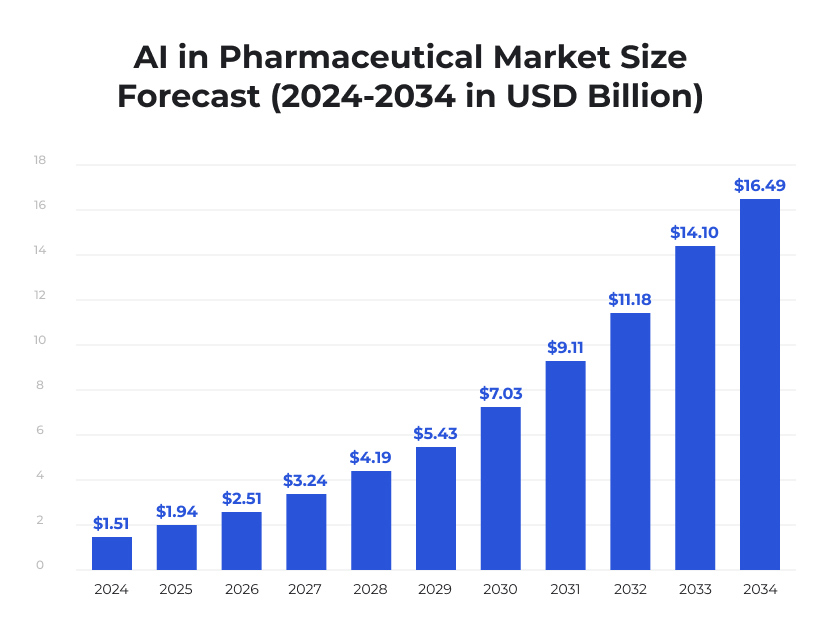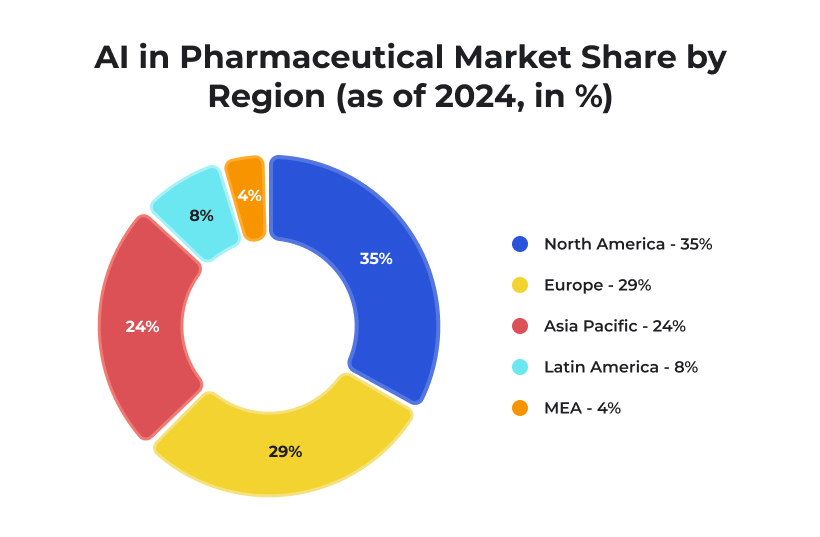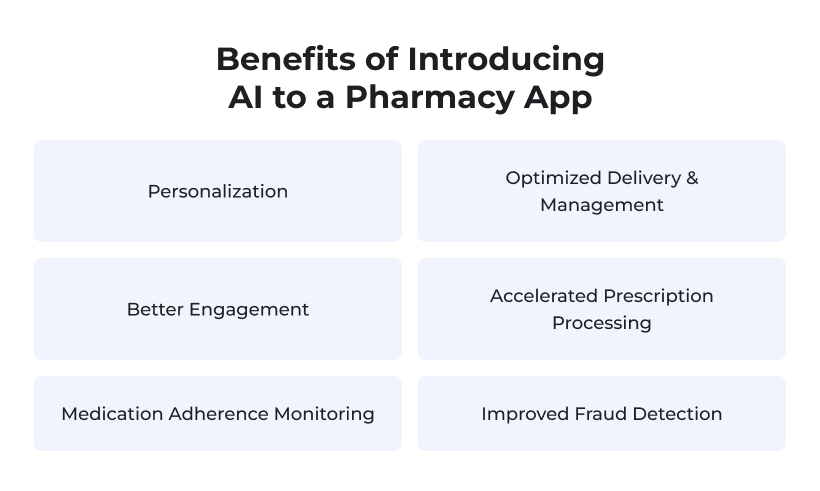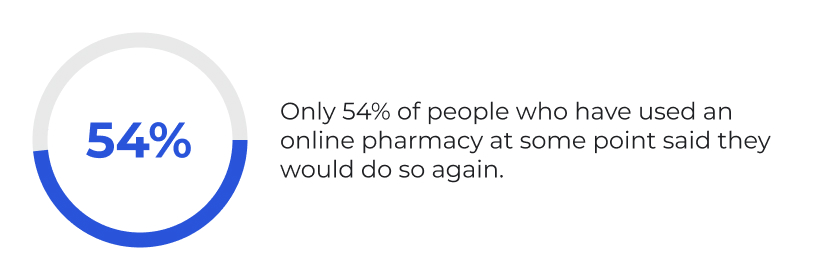So you’ve decided to make your pharmacy app more commercially viable by integrating Artificial Intelligence and/or Machine Learning into it? Or maybe you have an idea for a new online pharmacy solution and assume that AI/ML inclusion is mandatory?
You’re not wrong. Even though hundreds and even thousands of applications are successful without an AI/ML component, as time goes by and technology progresses, it becomes more of a “gold standard” and an expectation from investors and the audience alike.
But how can one determine whether their software belongs in an “AI/ML-powered” camp or not? We’ve gathered and structured the information about the most prominent AI/ML integration challenges and benefits specific to pharmaceutical apps to ease that decision-making burden for you a bit.
Does AI/ML Play a Significant Role in the Pharmaceutical Industry?
With all the concerning news about AI’s first attempts to disobey its creators, many business owners may feel rightfully worried if 2025 is the right time to invest resources in this technology and adopt it for their digital products.
Despite all the concerns and uncertainty regarding the future of the AI industry, the market is truly thriving and is forecasted to triple its size in just five years. This means that the number of digital products for a global pharmaceutical industry equipped with AI/ML is expected to grow exponentially.

You can view such a statistic one of two ways: either most of the market players are severely influenced by the general AI craze and fear they may miss out or AI/ML integration is beneficial for businesses, helping them to achieve specific results.
At the same time, most market players that have introduced AI/ML into their software and business practices are located in North America, Europe, and Asia Pacific, leaving other regions far behind. In the upcoming years, such a drastic divide is about to shrink as more and more businesses from underrepresented areas like Africa or the Middle East will adopt AI/ML-based pharmaceutical software. Yet North America and Europe will most probably remain the leaders.

One of the main driving forces for rapid AI/ML integration in the pharmaceutical industry across the globe is its multifunctionality. Pharmacy apps powered by AI and ML can facilitate more accurate diagnoses, enhance medication adherence, and streamline the overall patient experience. For example, virtual assistants and chatbots are increasingly used to answer customer queries and manage prescription refills. Additionally, predictive analytics can help pharmacies forecast demand for medications, optimize inventory management, and reduce operational costs. But that’s certainly not all. The introduction of Artificial Intelligence and Machine Learning can drive many positive changes from an operational and an image-building perspective.
Let’s dive into this subject a little bit further!
How AI/ML Integration Facilitates Success for Modern Pharmacy Applications
It’s worth mentioning that while there is an array of benefits most commonly associated with AI/ML adoption in the pharmaceutical industry, each entrepreneur may find their own unique advantages during the process as both business goals and expectations vary. So keep in mind that this section lists only the top perks of AI/ML-powered pharmacy applications highlighted by researchers, business owners, and customers.

Boost in Service Personalization
One of the most promising opportunities offered by AI in pharmacy apps is the ability to deliver personalized medication recommendations and health advice. AI systems can offer tailored recommendations that improve patient outcomes by analyzing individual patient data, including medical histories, current prescriptions, and even lifestyle factors. This level of personalization fosters a stronger patient-pharmacy relationship, encouraging customers to not only trust the service provider more but also share their positive experience with others promoting the app within their circle and further.
Optimized Delivery and Management
Operational efficiency is critical for pharmacies to remain competitive and ensure timely patient care. AI-powered predictive analytics can optimize inventory management by forecasting demand based on historical trends, seasonal variations, and local health trends. This foresight allows pharmacies to maintain optimal stock levels, reducing both wastage from overstocking and the risk of shortages.
In addition, automating routine tasks such as prescription processing, order management, and customer inquiries can significantly reduce administrative burdens. This automation not only frees up staff time for more critical tasks but also enhances the accuracy and speed of pharmacy operations. As a result, pharmacies can deliver faster service and reduce operational costs.
Higher Levels of Engagement
Personalization isn’t the only tool capable of improving customer engagement, ensuring longer interaction time with your pharmacy app. Stable, easy-to-use, feature-packed apps that provide smooth and fruitful user journeys typically have at least some form of Artificial Intelligence or Machine Learning technology. Tools like AI-powered virtual assistants and chatbots are available 24/7, providing real-time support and guidance. They help patients navigate complex medication regimens, answer health-related queries, and offer reminders for prescription refills. Such constant engagement not only enhances the patient experience but also drives adherence to prescribed treatments, ultimately contributing to better health outcomes. Pair up useful AI/ML solutions with some form of gamification, and you get yourself a receipt for a successful online pharmacy app the users will love.
Accelerated Prescription Processing
AI and ML technologies bring automation to many repetitive and time-consuming tasks within pharmacy operations. Automating prescription verification, data entry, and billing processes not only reduces the likelihood of human error but also speeds up service delivery. This efficiency is particularly valuable in busy pharmacy settings where delays can affect patient satisfaction and health outcomes.
Furthermore, automated systems can handle a high volume of transactions simultaneously, making it easier to manage peak times and sudden surges in demand. As a result, pharmacies can maintain a high level of service quality even during periods of increased activity. The automation of routine tasks enables pharmacy staff to focus on more complex issues that require human judgment and expertise, ultimately improving overall care delivery.
Medication Adherence Monitoring
Medication non-adherence is a significant challenge in healthcare, often leading to suboptimal treatment outcomes and increased hospital readmissions. AI can help address this issue by providing personalized reminders and adherence tracking. For example, pharmacy apps can use Machine Learning algorithms to predict when a patient is likely to miss a dose and send automated reminders or alerts to both patients and caregivers.
Additionally, AI systems can analyze adherence patterns to identify underlying issues and suggest tailored interventions. This proactive approach not only improves individual health outcomes but also reduces the overall burden on healthcare systems by preventing complications and hospitalizations. By leveraging AI for adherence monitoring, pharmacies can play a vital role in enhancing patient care and reducing healthcare costs.
Improved Fraud Detection
The proactive detection and prevention of fraudulent activities are essential components of a robust digital pharmacy ecosystem as pharmacy apps are increasingly becoming targets for fraudulent activities, including prescription fraud and unauthorized access to sensitive data. AI-powered systems can continuously monitor transactions and user behavior to detect patterns that may indicate fraudulent activity. Machine learning algorithms can be trained to recognize anomalies and flag them for further investigation, thereby reducing the risk of fraud.
By integrating AI-driven fraud detection, online pharmacies can protect both their financial assets and the sensitive personal data of their patients. This not only minimizes financial losses but also bolsters patient trust by ensuring that their information is secure.
What Challenges to Expect?
Now that we’ve covered all the potential benefits of AI/ML integration let’s elaborate on what difficulties a business owner may encounter along the way and how to overcome them without compromising the company’s integrity.
Inconsistent Data Quality and Availability
AI and ML models rely on large volumes of high-quality data to function effectively. In the pharmacy context, data can be fragmented, inconsistent, or incomplete, posing a significant challenge. Inaccurate or biased data can lead to flawed predictions and recommendations, ultimately compromising patient safety and operational efficiency.
Pharmacies must invest in robust data collection, cleaning, and management practices to ensure that the input data is both accurate and comprehensive. Data integration across multiple sources, such as electronic health records (EHRs), prescription databases, and patient feedback, is essential for building reliable AI systems. Without high-quality data, the potential benefits of AI may be severely limited.
Data Privacy and Security Concerns
Pharmacy apps handle highly sensitive health information, making data privacy and security paramount. Integrating AI often introduces additional layers of complexity in ensuring that all data is handled in compliance with stringent regulations such as HIPAA or GDPR. Not to mention, any breach in data security could have serious legal, financial, and reputational repercussions.
To address these concerns, pharmacies must implement robust cybersecurity measures like data encryption, access controls, and regular security audits. Partnering with reputable vendors with a proven data security track record is also critical. Ensuring all AI systems are designed with privacy-by-design principles can help mitigate risks and build user trust.

Regulatory and Compliance Hurdles
This challenge is a logical continuation of the previous one. As the healthcare industry remains one of the most heavily regulated sectors in the world, integrating AI into pharmacy apps must be done in strict compliance with numerous regulatory requirements, which can vary significantly across different regions and jurisdictions. And navigating this complex regulatory landscape is both time-consuming and resource-intensive.
Regulatory hurdles can delay the deployment of new AI/ML-based features, increase costs, and create uncertainty for developers. Pharmacies must work closely with legal experts and regulatory bodies to ensure that all AI implementations meet current standards and can adapt to future changes. This proactive approach to compliance is essential for the long-term success and sustainability of AI initiatives.
Complex Technical Integration and Legacy Systems
Many pharmacies operate on legacy systems that were not designed to support modern AI and ML technologies. Integrating new AI solutions into these existing infrastructures can be a complex and resource-intensive process. Compatibility issues may arise, requiring significant modifications or even complete system overhauls.
To overcome these challenges, pharmacies must adopt flexible, modular architectures that can seamlessly integrate with legacy systems. Investing in middleware, APIs, and other integration tools can help bridge the gap between old and new technologies. A well-planned integration strategy that includes phased implementation and thorough testing is essential for minimizing disruption during the transition.
Algorithmic Bias and Transparency
AI and ML algorithms are only as good as the data they are trained on, which means that inherent biases in the data can lead to biased outcomes. In the context of pharmacy apps, this can manifest as unequal treatment recommendations or inaccurate predictions for certain demographic groups. The “black box” nature of many advanced algorithms further complicates efforts to ensure fairness and transparency.
Addressing algorithmic bias requires continuous monitoring, validation, and adjustment of AI models. Pharmacies must invest in explainable AI techniques that allow for transparency in decision-making processes. Regular audits and interdisciplinary oversight can help ensure AI systems operate fairly and equitably across all patient populations.
Ethical Considerations and Liability
The use of AI in healthcare raises important ethical questions related to accountability, patient consent, and data ownership. In pharmacy apps, the implications of an AI-driven error can be significant, ranging from incorrect medication recommendations to breaches of patient privacy. Determining liability in cases where AI systems fail is a complex legal and ethical challenge.
Pharmacies must develop clear ethical guidelines and protocols for AI use, ensuring that patients are fully informed about how their data is used and how decisions are made. Engaging with legal experts and ethics committees is critical to developing frameworks that protect both patients and healthcare providers. Transparent communication and proactive risk management strategies are essential for addressing these ethical challenges head-on.
Strategies for Overcoming Challenges and Maximizing Opportunities
To fully harness the potential of AI and ML in pharmacy apps, companies must adopt a proactive and comprehensive strategy that addresses the aforementioned challenges while capitalizing on the opportunities.
- Embracing Interdisciplinary Collaboration. Building effective AI solutions requires collaboration between IT professionals, data scientists, clinicians, and regulatory experts. By fostering an interdisciplinary approach, pharmacies can ensure that AI implementations are both technically sound and clinically relevant. Regular cross-functional meetings and joint training sessions can help bridge the gap between technology and healthcare, ensuring that all perspectives are considered.
- Phased Implementation and Continuous Improvement. Given the complexity and cost of AI integration, a phased approach to implementation is advisable. Starting with pilot projects allows pharmacies to test and refine AI systems in a controlled environment before scaling up. Continuous monitoring, feedback loops, and iterative improvements ensure that the AI solutions remain effective and aligned with evolving needs.
- Leveraging Cloud-Based Solutions for Scalability. Pharmacies should consider cloud-based platforms that offer flexibility and high computational power to address performance and scalability challenges. Cloud solutions allow for dynamic scaling based on demand and can reduce the need for significant upfront investment in hardware. This approach not only improves performance but also supports the rapid deployment of AI-driven features.
- Engaging with External Partners and Vendors. Collaborating with established technology vendors and research institutions can provide access to specialized expertise and innovative solutions. Such partnerships can accelerate development timelines, reduce costs, and ensure that the latest advancements in AI and ML are integrated into the pharmacy app. Outsourcing certain aspects of the project to experienced partners can also help manage resource constraints.
- Continuous Innovation and Future-Readiness. The landscape of AI and ML is constantly evolving, and pharmacies must be prepared to adapt to new technologies and trends. Investing in research and development, staying informed about emerging advances such as blockchain for data security or IoT integration for real-time monitoring, and fostering a culture of innovation is essential for long-term success. By remaining agile and forward-thinking, pharmacies can not only address current challenges but also capitalize on future opportunities.
In Conclusion
Integrating Artificial Intelligence and Machine Learning into pharmacy apps represents a transformative opportunity for both the Healthcare and IT industries. The benefits ranging from personalized patient care and enhanced operational efficiency to advanced fraud detection and regulatory compliance, are compelling. However, these opportunities come with significant challenges that must be addressed for a business to succeed. So, the matter of choosing a reliable tech partner that can translate your business needs into a fully functional digital product the users will love is as pressing for pharmaceutical market players as ever. So, if you’re looking for an IT vendor you can trust, contact Light IT Global to book a free consultation and see if our diverse pool of pharmacy app development experts is the right fit for you!



